Puzzle games are an endless source of entertainment and mental stimulation. Whether you’re young or old, puzzle games offer exciting cognitive challenges that contribute to the development of intellectual skills. In this article, we’ll explore a variety of popular puzzle games suitable for all ages. Whether you’re a child, a teenager or an adult, there are some exciting puzzle games to challenge your brain. Let’s discover these exciting games together!
The importance of puzzle games
Puzzle games are more than just entertainment. They stimulate logical thinking, problem-solving, creativity and memory. These games stimulate different parts of the brain, promote concentration and improve cognitive skills. As well as being fun, puzzle games contribute to intellectual development, stress management and improved social skills. They also offer a welcome break from our digital world, allowing us to engage in analog, interactive activities.
Puzzle games for kids
Puzzles
Puzzles are a classic game that help children develop their problem-solving skills. The puzzles can be adapted to different levels of difficulty, depending on the child’s age. As well as stimulating logical thinking, they encourage hand-eye coordination and patience.
Building sets
Building sets such as blocks and LEGOs encourage creativity, spatial planning and problem-solving. Children can let their imaginations run wild while developing engineering and logic skills.
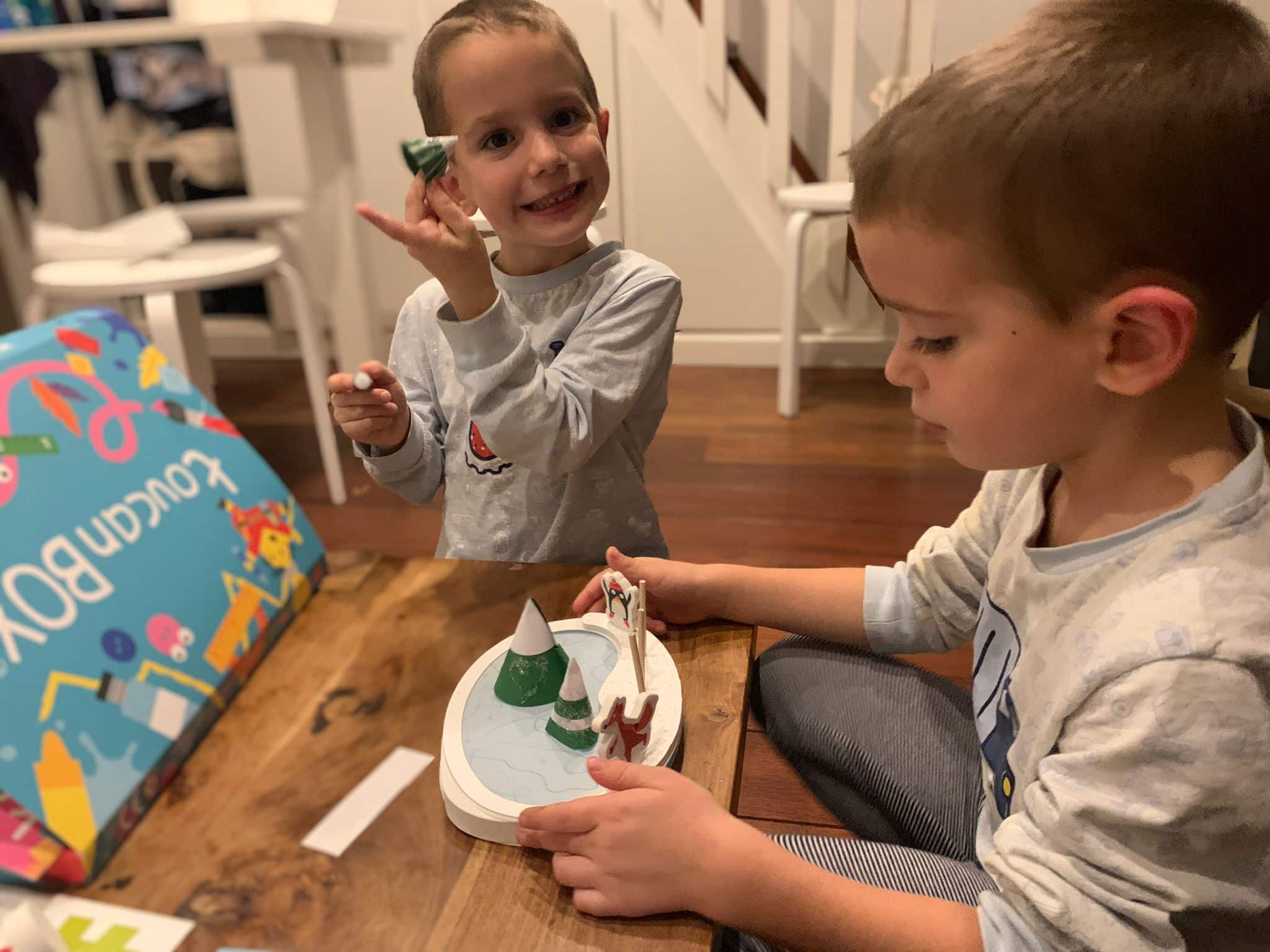
Board games
Board games such as chess, checkers, crosswords or Power 4 offer stimulating challenges for children. They promote strategic thinking, decision-making, concentration and social interaction.
COCO PENSE and COCO BOUGE, the educational and sports games program
The COCO THINKS and COCO MOVES application is a tablet game program offering over 30 educational activities to enhance learning (reading, spelling, math, history, etc.) or work on cognitive functions (attention, memory, language, etc.).
After 15 minutes of use, the app stops and offers a sports break, with more than 8 physical activities.
Puzzle Plus
Recreate jigsaw puzzles with the pieces present. Puzzles are easy games for all ages.
With this game you can stimulate visual perception as the child has to analyze the different pieces on the screen, and the visuo-spatial construction as they have to imagine the place of each piece to reproduce the final image.
You can see if the child uses strategies to complete the image (does he start at the edges, or does he base his work on the main image? Does he look only at the parts, or at the final image as well?) There are many ways to complete a puzzle, so you can increase your mental patterns patterns.

Coco at the beach
Find the fastest way to return Coco’s ball.
With this game, you stimulate visuospatial construction as the child imagines the ball’s movements in space. You also stimulate planning, as the child has to look for the fastest route and watch out for obstacles.
To move the ball, children press the arrows on the right of the screen, stimulating their finger motor skills.
In this game, there are several objects (the ball, the obstacles, Coco), so you also stimulate divided attention.

Dancing with Coco
Dance with Coco to the rhythm of the music.
Children can dance to their heart’s content or follow the choreography suggested by Coco, the important thing being to follow the rhythm of the music.
With this game, you stimulate the adaptation of movement, which must be slow or fast, depending on the music.


Puzzle games for teenagers
Riddles and puzzles
The riddles and puzzles are perfect for teenagers who like to rack their brains. They test logic, problem-solving and creativity. Riddles can take the form of riddles, mazes or mathematical problems.
Escape games
Escape games, whether physical or online, have become very popular. They challenge players to solve puzzles, find clues and escape from a given location within a given time. These challenging games reinforce strategic thinking and team spirit.
Digital puzzle games
Teens can also enjoy puzzle games on electronic devices, such as word games, digital puzzles or logic games. These games are often interactive and offer a variety of challenges to exercise thinking and memory.

Puzzle games for adults
Complex puzzles
Complex puzzles are ideal for adults who like to challenge themselves intellectually. These puzzles can be word games, mathematical problems or sophisticated brainteasers. They stimulate creativity, logic and problem-solving.
Strategy games
Strategy games, such as chess, strategic card games or tactical board games, are perfect for adults who like to plan and anticipate moves. These games develop strategic thinking, decision-making and concentration.
Online puzzle games
Online puzzle games offer a variety of options for adults. From word games to digital puzzles and logic games, there are plenty of online games to challenge your cognitive skills and keep you entertained at the same time.
Clint, you brain coach
With over 30 games already available, players can use their language, organization and other cognitive functions. Joe goes everywhere with you, because the application doesn’t need Wi-Fi to work (wifi is only required for updates).
Crowded Parking Lot
Move the cars in the parking lot to bring out the yellow car.
With this game, you can stimulate all cognitive functions.
The person must use his or her visual perception skills to analyze the position of the cars, their size and orientation, so as to be able to move them. Then she has to create mental images to imagine the possible movements of the cars and their consequences.
What’s more, to solve this puzzle and find the right sequence of movements to get the yellow car out, you’re also stimulating logic and planning.
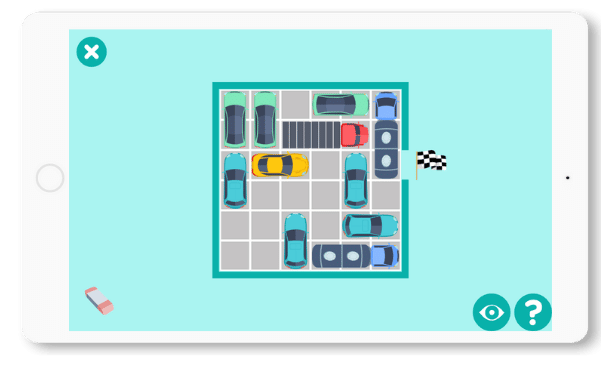
Syllabus
Find the words from the syllables.
This game stimulates different language functions.
To perform this game, the person must use their meta-phonological skills. She has to read, understand and memorize the syllables on the screen. She must then create mental images to imagine the different possible combinations.
To create words from syllables, the person must be able to perform phonemic synthesis.
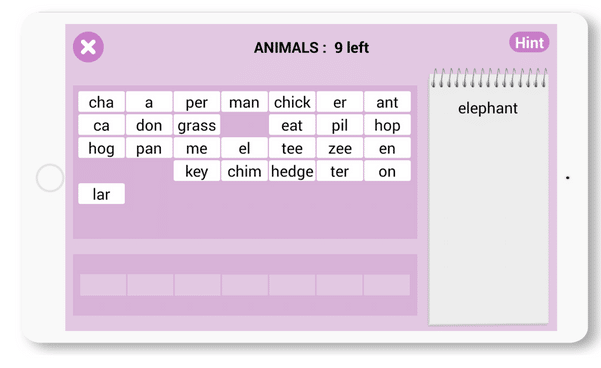
The benefits of puzzle games
Puzzle games are not only fun, they also offer many benefits for mental health and well-being. Here are some of the main benefits of puzzle games:
- Cognitive stimulation: Thinking games stimulate brain activity, improving cognitive skills such as memory, attention, concentration and problem-solving. They are therefore beneficial for all ages, from children to the elderly.
- Improved social skills: Some puzzle games can be played in groups, encouraging social interaction, communication, collaboration and healthy competition. This helps strengthen social ties and develop interpersonal skills.
- Stress reduction: Puzzle games are an effective way to relax and enjoy yourself. They allow you to concentrate on a pleasant, entertaining activity, which can help reduce stress, anxiety and negative thoughts.
- Maintaining mental health: Playing puzzle games regularly can contribute to mental health by stimulating the brain, fostering creativity and offering an intellectual challenge. It can also help prevent age-related cognitive disorders such as dementia and Alzheimer’s disease.
- Improving academic skills: Some puzzle games are specially designed to strengthen academic skills, including math, logic, reading and problem-solving. They can be a valuable educational tool for children and students.
Popular puzzle games
There are a wide variety of popular puzzle games to suit all ages and skill levels. Here are some of our most popular puzzle games:
- Jigsaw puzzles: Jigsaw puzzles are classic puzzle games that involve putting pieces together to reconstruct a picture. They come in different sizes and levels of difficulty, from simple puzzles for children to complex puzzles for adults.
- Riddles and puzzles: Riddles and puzzles are thinking games that test your ability to solve logical problems and find solutions. They can include riddles, math problems and logic challenges.
- Strategy games: Strategy games such as chess, checkers, go and strategic board games like Risk and Monopoly are examples of games that require strategic thinking, planning and decision-making.

4. Crosswords and word jumbles: Word games such as crosswords and word jumbles are excellent thinking exercises that improve memory, spelling and mental acuity.
5. Logic games: Logic games, such as Sudoku, Towers of Hanoi and Mastermind, challenge your ability to find patterns and solve problems logically.
Tips for choosing and playing puzzle games
When choosing puzzle games, it’s important to take certain factors into account to make sure they match your preferences and goals. Here are some tips for choosing and playing puzzle games:
- Identify your preferences: Consider your personal preferences, interests and goals. Choose puzzle games that you enjoy and that motivate you to play them regularly.
- Adapt the level of difficulty: Select puzzle games adapted to your skill level. Start with simpler games and progress to higher levels of difficulty as you become more comfortable.
- Vary the types of games: Try out different types of puzzle games to stimulate different cognitive abilities. Alternate between logic games, puzzles, strategy games and more.
- Play regularly: To get the most out of it, play puzzle games regularly. This will keep your brain active and develop your thinking skills over time.
- Play in a group: Puzzle games can be even more fun when played in a group. Organize game nights with family and friends for fun and mental stimulation.
Popular puzzle games offer many benefits for mental health and well-being. They stimulate cognition, improve social skills, reduce stress, maintain mental health and enhance academic skills. Choose from a variety of puzzle games, such as puzzles, riddles, strategy games, word games and logic games, depending on your preferences and goals. Play regularly and enjoy moments of entertainment and mental stimulation with your loved ones.
COCO THINKS and COCO MOVES
An educational and sporty version for children from 5 to 10 years old
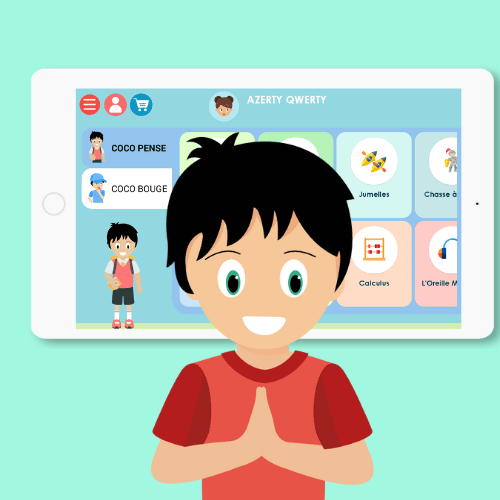
CLINT
A version for adults and seniors in prevention
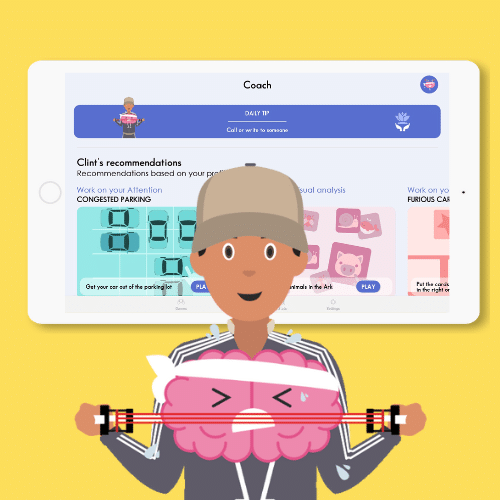
SCARLETT
An easy and adapted version for seniors
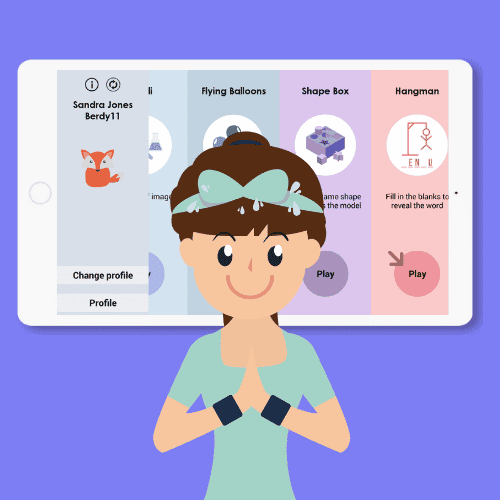
Other articles that might interest you:
How Parents Can Contribute to Teacher Training
As we delve into the realm of education, it becomes increasingly clear that teacher training is not merely a...
Differentiated Instruction Approaches: Training and Practical Application
Differentiated instruction is a pedagogical approach that recognizes the diverse needs of students in a classroom. It...
Key Skills Teachers Need to Support Students with Special Needs
As we embark on our journey to support children with special needs, it is essential for us to cultivate a deep...












